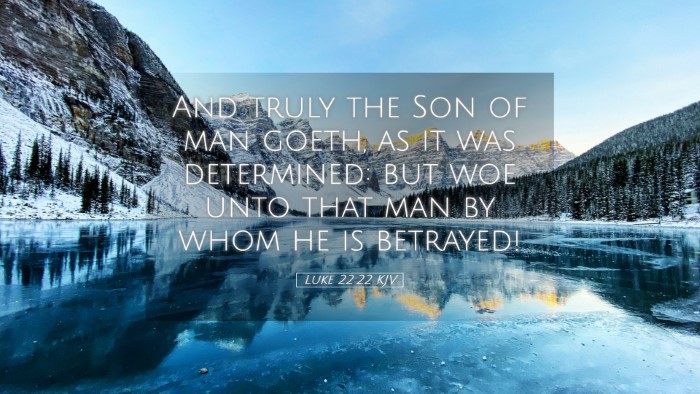Commentary on Luke 22:22
Luke 22:22 states:
"And truly the Son of Man goes as it has been determined; but woe to that man by whom He is betrayed!"
Overview
This verse marks a significant moment in the narrative of the Passion of Christ. It reveals the preordained nature of Jesus' death and highlights the grave consequences for Judas Iscariot, the betrayer. This commentary aims to explore the theological implications and practical applications of this verse by drawing insights from respected public domain Bible commentators.
The Divine Plan
Matthew Henry emphasizes that the phrase "as it has been determined" indicates the sovereignty of God in the redemptive plan. This plan was not an afterthought but a foreordained scheme known to God from the beginning. The role of betrayal was prophesied in the Scriptures, underscoring God's omniscience:
- God's Foreknowledge: The betrayal by Judas was part of God’s plan, fulfilling various Old Testament prophecies.
- Dramatic Irony: While Satan enters Judas, God’s purpose remains intact, highlighting the interplay between divine sovereignty and human agency.
The Weight of Betrayal
Albert Barnes draws attention to the term "woe" in Jesus’ warning. The severe declaration signifies the seriousness of betrayal. Barnes points out that the consequences of sin, particularly betrayal of such magnitude, carry grave implications:
- Moral Accountability: Judas' actions not only led to Christ's crucifixion but also demonstrate personal accountability before God.
- Spiritual Despair: The betrayal emphasizes the torment that comes with turning one's back on Christ, raising questions about Judas' ultimate fate.
Character of Judas Iscariot
Adam Clarke elucidates on Judas Iscariot's character and motivations. Clarke suggests that Judas did not initially appear malevolent; rather, he was lured by greed and discontent:
- Pervasive Influence of Sin: Judas was among the closest followers of Jesus yet succumbed to earthly temptations.
- Warning to Believers: Clarke's commentary serves as a cautionary tale for Christians today; even those within the fold must guard against the subtleties of sin.
The Fulfillment of Prophecy
The event encapsulated in this verse fulfills numerous Old Testament prophecies. Matthew Henry points out that the betrayal of Jesus had been foreshadowed in texts such as Psalm 41:9:
"Even my own familiar friend in whom I trusted, who ate my bread, has lifted up his heel against me."
This prophetic fulfillment serves as a testament to the reliability of God's Word and the unfolding of His plan through history:
- Assurance of God's Control: The realization that God prophesied Judas' betrayal bolsters faith in His sovereign control over human history.
- Call to Reflection: Understanding this fulfillment should lead believers to reflect on their own faithfulness to Christ.
Practical Applications
Considering the grave implications of betrayal, this verse's lessons transcend time and continually speak to the hearts of Christians:
- Examine Your Heart: Like Judas, believers must regularly evaluate their motives and actions in their walk with Christ.
- Stay Vigilant Against Temptation: The narrative serves as a reminder of the subtle ways sin can infiltrate one's life.
- Encouragement from God’s Sovereignty: Even in moments of betrayal and suffering, believers can find solace in knowing that God is still in control.
Conclusion
Luke 22:22 is a powerful reminder of the seriousness of sin and betrayal. Through the insights of Matthew Henry, Albert Barnes, and Adam Clarke, we see the interplay between divine authority and human choice. Ultimately, this verse invites both reflection and action, challenging us to walk faithfully with the One who knew betrayal yet chose to fulfill God's redemptive plan.


